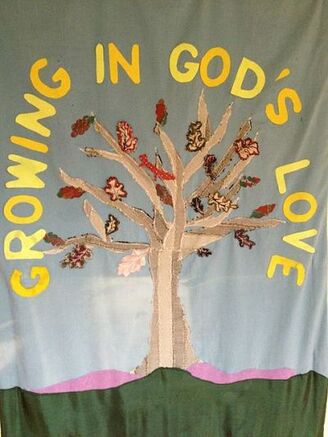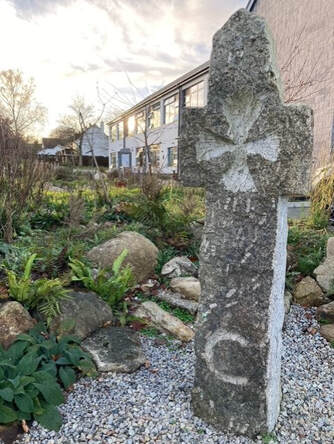RELIGIOUS EDUCATION
|
Statement of Intent for Religious Education
At our Three Hares Primary Schools, it is our intent for the Religious Education element of our school curriculum to engage, inspire, challenge and encourage pupils, equipping them with the knowledge and skills to answer challenging questions. This allows the exploration of different religious beliefs, values and traditions and develop a more rigorous understanding of the numerous religious traditions, beliefs and practices that are followed in our multi-cultural society. We want them to know how religious education enables pupils to combat prejudice, preparing them for adult life, employment and life-long learning. AIMS The national curriculum for Religious Education aims to ensure that all pupils:
|
QUICK LINKS
CURRICULUM OVERVIEW |
Principal aim
The principal aim of religious education is to explore what people believe and what difference this makes to how they live, so that pupils can gain the knowledge, understanding and skills needed to handle questions raised by religion and belief, reflecting on their own ideas and ways of living.
At Chagford we use the Devon and Torbay agreed syllabus 2019 - 2024. This syllabus reflects a broad and inclusive curriculum, exploring religion and world views. Staff have received training and will continue to be supported by the curriculum leader, SACRE and the Diocese of Exeter.
The curriculum for RE aims to ensure that all pupils:
1. Make sense of a range of religious and non-religious beliefs, so that they can:
• identify, describe, explain and analyse beliefs and concepts in the context of living religions, using appropriate vocabulary
• explain how and why these beliefs are understood in different ways, by individuals and within communities
• recognise how and why sources of authority (e.g. texts, teachings, traditions, leaders) are used, expressed and interpreted in different ways, developing skills of interpretation
2. Understand the impact and significance of religious and non-religious beliefs, so that they can:
• examine and explain how and why people express their beliefs in diverse ways
• recognise and account for ways in which people put their beliefs into action in diverse ways, in their everyday lives, within their communities and in the wider world
• appreciate and appraise the significance of different ways of life and ways of expressing meaning
3. Make connections between religious and non-religious beliefs, concepts, practices and ideas studied, so that they can:
• evaluate, reflect on and enquire into key concepts and questions studied, responding thoughtfully and creatively, giving good reasons for their responses
• challenge the ideas studied, and allow the ideas studied to challenge their own thinking, articulating beliefs, values and commitments clearly in response
• discern possible connections between the ideas studied and their own ways of understanding the world, expressing their critical responses and personal reflections with increasing clarity and understanding
We use an enquiry based approach to RE teaching and learning:
- Asking questions: Refine and define enquiries using a range of methods and sources
- Investigation: Collect, compare, analyse and interpret information
- Drawing conclusions: Organise and present findings to develop arguments and suggest interpretations
- Evaluation: Critically evaluate
- Reflection and expression: Apply critical thinking and reflection to evaluate learning
Foundation Stage
During Foundation Stage, children begin to explore the world of religion in terms of special people, books, times, places and objects, visiting places of worship and through celebration. Children listen to and talk about stories. They are introduced to specialist words and use their senses in exploring religious beliefs, practices and forms of expression. They reflect upon their own feelings and experiences. They use their imagination and curiosity to develop their appreciation and wonder of the world in which they live.
KS1
At Key Stage 1, pupils learn about different beliefs about God and the world around them. They encounter and respond to a range of stories, artefacts and other religious materials. They learn to recognise that beliefs are expressed in a variety of ways, and begin to use specialist vocabulary. They begin to understand the importance and value of religion for believers, especially other children and their families. Pupils ask relevant questions and develop a sense of wonder about the world, using their imaginations. They talk about what is important to themselves and others, valuing themselves, reflecting on their own feelings and experiences and developing a sense of belonging. At Key Stage, 1 pupils should study Christianity, one other religion and consider other world views.
KS2
At Key Stage 2, children investigate and consider the impact of religion and belief locally, nationally and globally. They make connections between different aspects of religion and belief and consider different forms of religious expression. They consider the beliefs, teachings, practices and ways of life central to religion. They learn about sacred texts and other sources and consider their meanings. They begin to recognise diversity in religion, learning about similarities and differences both within and between religions and the importance of dialogue between them. They extend the range and use of specialist vocabulary. They recognise the challenges involved in distinguishing between ideas of right and wrong, and valuing what is good and true. They communicate their ideas clearly, recognising other people’s viewpoints. They consider their own beliefs and values and those of others in the light of their learning in religious education. At Key Stage 2, children study, in a more systematic way, Christianity, Hinduism, Judaism and Islam and non-religious world views such as Humanism.
This syllabus is designed to support schools in developing and delivering excellence in RE. It responds to national calls for deepening pupils’ knowledge about religions and for developing their ‘religious literacy’. It does this by studying one religion at a time (‘systematic’ units), and then including ‘thematic’ units, which build on learning by comparing the religions, beliefs and practices studied.
In order to support teachers in exploring the selected beliefs, this syllabus sets out an underlying teaching and learning approach, whereby pupils encounter core concepts in religions and beliefs in a coherent way, developing their understanding and their ability to handle questions of religion and belief.
The teaching and learning approach has three core elements, which are woven together to provide breadth and balance within teaching and learning about religions and beliefs, underpinning the aims of RE outlined on p.8 of the Devon & Torbay Agreed Syllabus for RE 2019 - 2024. Teaching and learning in the classroom will encompass all three elements, allowing for overlap between elements as suits the religion, concept and question being explored.
These elements set the context for open exploration of religion and belief. They offer a structure through which pupils can encounter diverse religious traditions alongside non-religious worldviews – which reflect the backgrounds of many pupils in our school. The elements present a broad and flexible strategy that allows for different traditions to be treated with integrity. These elements offer a route through each unit while also allowing for a range of questions reflecting different approaches, for example, from religious studies, philosophy, sociology, ethics and theology.
Teaching and learning approach and the aims for RE in Devon and Torbay
The three elements of the teaching and learning approach in this syllabus reflect the aims for RE set out on p.8 of the Devon & Torbay Agreed Syllabus for RE 2019 - 2024. Units of study offer content and ideas for enabling pupils to achieve these aims. These three elements are:
Making sense of beliefs
- Identify, describe, explain and analyse beliefs and concepts in the context of living religions, using appropriate vocabulary
- explain how and why these beliefs are understood in different ways, by individuals and within communities
- recognise how and why sources of authority (e.g. texts, teachings, traditions, leaders) are used, expressed and interpreted in different way, developing skills of interpretation
- examine and explain how and why people express their beliefs in diverse way
- recognise and account for ways in which people put their beliefs into action in diverse ways, in their everyday lives, within their communities and in the wider world
- appreciate and appraise the significance of different ways of life and ways of expressing meaning
- evaluate, reflect on and enquire into key concepts and questions studied, responding thoughtfully and creatively, giving good reasons for their responses
- challenge the ideas studied, and allow the ideas studied to challenge their own thinking, articulating beliefs, values and commitments clearly in response
- discern possible connections between the ideas studied and their own ways of understanding the world, expressing their critical responses and personal reflections with increasing clarity and understanding
For Church schools, two additional units are provided in the Understanding Christianity materials: How can following God bring freedom and justice? (People of God)
What difference does the Resurrection make for Christians? (Salvation)
|
RELIGIOUS
EDUCATION |
AUTUMN 2021 |
SPRING 2022 |
SUMMER 2022 |
|
YEARS 1 and 2 |
1.2 Who do Christians say made the world? |
1.6 Who is a Muslim and how do they live? |
1.4 What is the ‘good news’ Christians
believe Jesus Brings? 1.9 How should we care for the world and for others, and why does it matter? |
|
1.8 What makes some places sacred to
believers? 1.3 Why does Christmas matter to Christians? |
1.6 contd. Who is a Muslim and how do they
live? 1.10 What does it mean to belong to a faith
community? 1.5 Why does Easter matter to Christians? |
1.7 Who is
Jewish and How do they live? |
|
|
YEAR 3 |
L2.1 What do Christians learn from the Creation story? |
1.6 Who is a Muslim and how do they live? L2.9 How do festivals and worship show what matters to a Muslim? |
L2.4 What kind of world did Jesus want? 1.4 What is the ‘good news’ Christians believe Jesus brings? |
|
L2.2 What is it like for someone to follow
God? 1.3 Why does Christmas matter to Christians? |
L2.10 How do festivals and family life show
what matters to Jewish people? 1.5 Why does Easter matter to Christians? |
L2.12 How and why do people try to make the
world a better place? 1.8 What makes some places sacred to believers? |
|
|
YEAR 4 |
|
L2.8 What does it mean to be Hindu in Britain today? |
L2.6 For Christians, when Jesus left, what was the impact of Pentecost? |
|
L2.7 What do Hindus believe God is like? |
L2.5 Why do Christians call the day Jesus died ‘Good Friday’? |
L2.11 How and why do people mark the significant events of life? |
|
|
YEARS 5 and 6 |
U2.8 What
does it mean to be a Muslim in Britain today? |
U2.9 Why is
the Torah so important to Jewish people? |
U2.4
Christians and how to live – What would Jesus do? U2.12 How
does faith help people when life gets hard |
|
U2.7 Why do
Hindus want to be good? U2.11Why do
some people believe in God and others not? |
U2.3Why do
Christians believe Jesus was the Messiah? U2.5 What do
Christians believe Jesus did to ‘save’ people? |
U2.10 What
matters most to Humanists and Christians? U2.2 Creation
and science : conflicting or complementary? |




